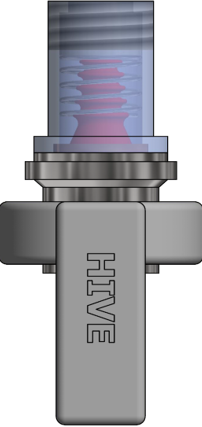Engineering startup takes first place at Skandalaris Venture Competition
HIVE Medical won $10,000 and plans to submit its device to the FDA for regulatory clearance

One would think that Joe Beggs, who earned a bachelor’s degree in biomedical engineering from the McKelvey School of Engineering in 2020, would be used to success.
While a student at Washington University in St. Louis, he launched a successful startup, HIVE Medical Inc. HIVE developed a device that would help track use of outpatient parental antimicrobial therapy (OPAT), a treatment patients use at home through a peripherally inserted central catheter (PICC) line to treat blood infections. The device works with software developed by the team to allow clinicians to better monitor patients’ compliance and prevent hospital readmissions.
“Our guiding principle is to restore trust between providers and their patients by providing transparency so providers don’t have to question the truthfulness of their patients,” Beggs said.

Their innovation has been a hit. In 2019, they came in first place at the IDea Incubator, hosted by the Infectious Diseases Society of America Foundation, as well as the Discovery Competition in McKelvey Engineering.
And most recently, Beggs and HIVE won first place in the spring 2021 Skandalaris Venture Competition, which aims to provide startups with funds and expert mentorship to help them ready their ideas for commercialization, launch and investors.
Still, Beggs admitted to being surprised by the team’s win. During the Zoom award presentation, as the honorable mentions, third-place and second-place winners were announced, he said he could remember the anticipation building as he and his family gathered around the computer.
“At each announcement, I was like, ‘Oh my God, is this us? Are we honorable-mention level? Maybe we're third place,’” he said. "Right before they announced first place, I remember thinking ‘There's no way we're first. There were 70 teams!’”
They were first, however, winning $10,000. The funds will help the HIVE team commission a professional regulatory strategy from Graematter, a St. Louis-based consulting group.
“Graematter has been very generous with us and has given us a lot of pro bono advice about our regulatory strategy,” he said. “We want to take that to the next level and get a full recommendation and plan for testing and submitting to the FDA so we can get our regulatory clearance.”
Following that, the team plans to use the remaining funds to fabricate Food and Drug Administration (FDA) compliant prototypes, which will allow it to move ahead with a pilot study. The group has discussed the possibility of launching a pilot site at Barnes-Jewish Hospital, as well as developing a relationship with Mercy Health.
“Our target customer partnerships are local, and we’ve got local partners within the community,” he said. “We feel very strongly that St. Louis is the best place for us.”
As many of the founding team members transition to full-time jobs and take on more passive roles within the team, HIVE is looking to hire new engineers and developers. They’re also offering internships for students over the summer, a switch in roles for Beggs who just last year was doing internships himself.
“It seems like everything I’ve done has been important in one way or another to what I’m doing right now,” Beggs said. “It was pivotal to come to WashU. It’s rapidly accelerated my growth. It’s given me room to mentor.”



